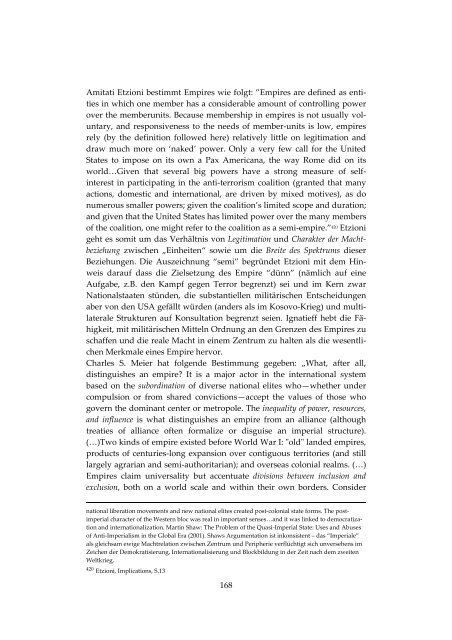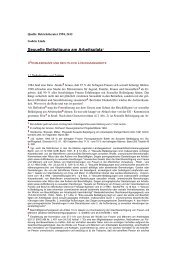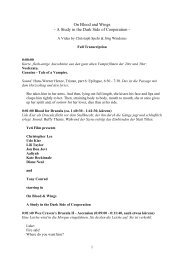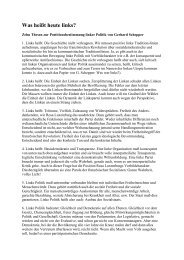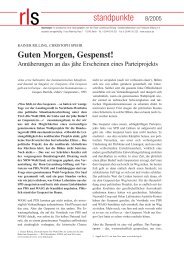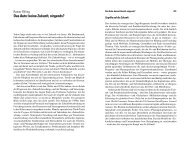outbreak. let's take over. american empire als wille ... - Rainer Rilling
outbreak. let's take over. american empire als wille ... - Rainer Rilling
outbreak. let's take over. american empire als wille ... - Rainer Rilling
Erfolgreiche ePaper selbst erstellen
Machen Sie aus Ihren PDF Publikationen ein blätterbares Flipbook mit unserer einzigartigen Google optimierten e-Paper Software.
Amitati Etzioni bestimmt Empires wie folgt: ”Empires are defined as entities<br />
in which one member has a considerable amount of controlling power<br />
<strong>over</strong> the memberunits. Because membership in <strong>empire</strong>s is not usually voluntary,<br />
and responsiveness to the needs of member-units is low, <strong>empire</strong>s<br />
rely (by the definition followed here) relatively little on legitimation and<br />
draw much more on ‘naked’ power. Only a very few call for the United<br />
States to impose on its own a Pax Americana, the way Rome did on its<br />
world…Given that several big powers have a strong measure of selfinterest<br />
in participating in the anti-terrorism coalition (granted that many<br />
actions, domestic and international, are driven by mixed motives), as do<br />
numerous smaller powers; given the coalition’s limited scope and duration;<br />
and given that the United States has limited power <strong>over</strong> the many members<br />
of the coalition, one might refer to the coalition as a semi-<strong>empire</strong>.” 420 Etzioni<br />
geht es somit um das Verhältnis von Legitimation und Charakter der Machtbeziehung<br />
zwischen „Einheiten“ sowie um die Breite des Spektrums dieser<br />
Beziehungen. Die Auszeichnung “semi” begründet Etzioni mit dem Hinweis<br />
darauf dass die Zielsetzung des Empire “dünn” (nämlich auf eine<br />
Aufgabe, z.B. den Kampf gegen Terror begrenzt) sei und im Kern zwar<br />
Nation<strong>als</strong>taaten stünden, die substantiellen militärischen Entscheidungen<br />
aber von den USA gefällt würden (anders <strong>als</strong> im Kosovo-Krieg) und multilaterale<br />
Strukturen auf Konsultation begrenzt seien. Ignatieff hebt die Fähigkeit,<br />
mit militärischen Mitteln Ordnung an den Grenzen des Empires zu<br />
schaffen und die reale Macht in einem Zentrum zu halten <strong>als</strong> die wesentlichen<br />
Merkmale eines Empire hervor.<br />
Charles S. Meier hat folgende Bestimmung gegeben: „What, after all,<br />
distinguishes an <strong>empire</strong>? It is a major actor in the international system<br />
based on the subordination of diverse national elites who—whether under<br />
compulsion or from shared convictions—accept the values of those who<br />
g<strong>over</strong>n the dominant center or metropole. The inequality of power, resources,<br />
and influence is what distinguishes an <strong>empire</strong> from an alliance (although<br />
treaties of alliance often formalize or disguise an imperial structure).<br />
(…)Two kinds of <strong>empire</strong> existed before World War I: ʺoldʺ landed <strong>empire</strong>s,<br />
products of centuries-long expansion <strong>over</strong> contiguous territories (and still<br />
largely agrarian and semi-authoritarian); and <strong>over</strong>seas colonial realms. (…)<br />
Empires claim universality but accentuate divisions between inclusion and<br />
exclusion, both on a world scale and within their own borders. Consider<br />
national liberation movements and new national elites created post-colonial state forms. The postimperial<br />
character of the Western bloc was real in important senses…and it was linked to democratization<br />
and internationalization. Martin Shaw: The Problem of the Quasi-Imperial State: Uses and Abuses<br />
of Anti-Imperialism in the Global Era (2001). Shaws Argumentation ist inkonsistent – das “Imperiale”<br />
<strong>als</strong> gleichsam ewige Machtrelation zwischen Zentrum und Peripherie verflüchtigt sich unversehens im<br />
Zeichen der Demokratisierung, Internationalisierung und Blockbildung in der Zeit nach dem zweiten<br />
Weltkrieg.<br />
420 Etzioni, Implications, S.13<br />
168


